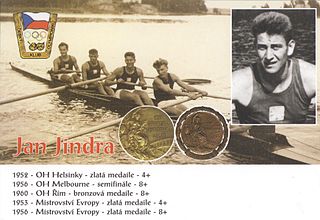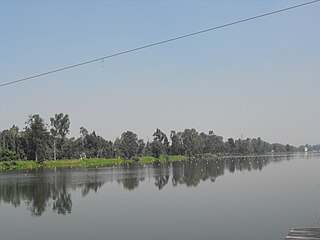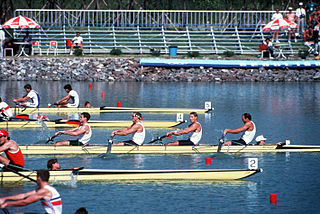
The men's coxed pair event was a rowing event conducted as part of the 1964 Summer Olympics programme. It was held from 11 to 15 October. There were 16 boats from 16 nations, with each nation limited to a single boat in the event. The event was won by American crew Edward Ferry, Conn Findlay, and coxswain Kent Mitchell. Findlay had been on the United States gold medal crew in 1956 and bronze medal crew in 1960; he was the first man to earn two gold medals in the event, as well as the first man to win three medals of any color in the event. Mitchell had also been on the 1960 crew, and was the seventh man to earn multiple medals in the coxed pair. Jacques Morel, Georges Morel, and cox Jean-Claude Darouy took silver to earn France's first medal in the event since 1952. Herman Rouwé, Erik Hartsuiker, Jan Just Bos earned what was formally the Netherlands' first medal in the event; a pair of Dutch rowers had won the first edition in 1900, but had jettisoned their cox in favor of a local French boy between rounds and thus that medal was a "mixed team" medal.

The men's coxed four event was a rowing event conducted as part of the Rowing at the 1964 Summer Olympics programme. It was held from 11 to 15 October. There were 16 boats from 16 nations, with each nation limited to a single boat in the event. The event was won by the United Team of Germany, the nation's second consecutive victory in the men's coxed four. The two medals placed the United Team of Germany in a tie for second-most all-time with Switzerland and Italy; Germany had the most with four. Italy earned its third straight medal in the event, all of different colours, with a silver in Tokyo. The bronze medal went to the Netherlands, the nation's first medal in the event since 1900.

The men's coxed four event was part of the rowing programme at the 1924 Summer Olympics. The competition, the fourth appearance of the event, was held from 13 to 17 July 1924 on the river Seine. There were 10 boats from 10 nations, with each nation limited to a single boat in the event. The event was won by Switzerland, the nation's second consecutive victory in the event; the two Swiss victories matched Germany for most among nations to that point. France earned its first medal in the event since 1900 with silver. The United States reached the podium for the second straight Games with a bronze medal. Hans Walter, a member of the Swiss crew in 1920 as well as this year, was the first man to win two medals in the event, and the only one to win two golds.

The men's coxed four event was part of the rowing programme at the 1928 Summer Olympics. It was one of seven rowing events for men and was the fifth appearance of the event. It was held from 3 to 10 August. There were 11 boats from 11 nations, with each nation limited to a single boat in the event. The event was won by Italy, the nation's first medal in the men's coxed four. The Italian team dethroned two-time reigning champion Switzerland, beating the Swiss crew in both the semifinals and the final. Switzerland's silver medal brought its podium streak in the event to three Games; the United States had its two-Games medal streak end. Poland took bronze, its first medal in the event.

The men's coxed pair competition at the 1972 Summer Olympics in Munich took place from 27 August to 2 September at the Olympic Regatta Course in Oberschleißheim. There were 21 boats from 21 nations, with each nation limited to a single boat in the event. The event was won by East German crew Wolfgang Gunkel, Jörg Lucke, and coxswain Klaus-Dieter Neubert; it was the first medal in the event for East Germany as a separate nation. Czechoslovakia (silver) and Romania (bronze) also won their first medals in the men's coxed pair.

The men's coxed four competition at the 1972 Summer Olympics in Munich took place from 27 August to 2 September at the Olympic Reggatta Course in Oberschleißheim. There were 14 boats from 14 nations, with each nation limited to a single boat in the event. The event was won by West Germany; it was the nation's first medal as a separate team, but the third time in four Games that a West German crew had won gold. East Germany repeated as silver medallists, though with a new crew. Bronze went to Czechoslovakia, the nation's first medal in the men's coxed four since 1952.

The men's coxed four competition at the 1932 Summer Olympics in Los Angeles took place at the Long Beach Marine Stadium. It was held from 10 to 13 August. There were 7 boats from 7 nations, with each nation limited to a single boat in the event. The event was won by Germany, the nation's first victory in the event since 1912 and third overall. Defending champions Italy came within 0.2 seconds of repeating, with Germany passing them at the very end of the final. Poland won its second consecutive bronze medal.

The men's coxed four rowing competition at the 1980 Summer Olympics took place at Krylatskoye Sports Complex Canoeing and Rowing Basin, Moscow, Soviet Union. The event was held from 20 to 27 July. There were 12 boats from 12 nations, with each nation limited to a single boat in the event. The event was won by East Germany, the nation's first victory after three consecutive silver medals since it began competing separately in 1968. Defending champions the Soviet Union finished second, while Poland's bronze medal was the first medal in the men's coxed four for that nation since 1932. Twin brothers Ullrich and Walter Dießner became the sixth and seventh men to earn two medals in the event, as they had also competed on the 1976 East German silver medal team.

The men's coxed four competition at the 1936 Summer Olympics in Berlin took place are at Grünau on the Langer See. It was held from 12 to 14 August. There were 16 boats from 16 nations, with each nation limited to a single boat in the event. The event was won by Germany, the second time the nation had won two consecutive gold medals in the men's coxed four. Germany's four gold medals overall was the most any nation won in the event before it was discontinued; four nations won two. Switzerland, which had won three straight medals in the 1920s before not competing in 1932, returned to the podium with a silver medal. Bronze went to France, the nation's first medal in the event since 1924. Both Italy and Poland had two-Games medal streaks broken.

The men's coxed four competition at the 1956 Summer Olympics took place at Lake Wendouree, Ballarat, Australia. It was held from 23 to 27 November and was won by the team from Italy. There were 10 boats from 10 nations, with each nation limited to a single boat in the event. Italy had previously won this event in 1928, tying Switzerland for second-most wins among nations. Sweden (silver) and Finland (bronze) each won their first medal in the men's coxed four. Switzerland had its three-Games silver-medal streak broken, without a Swiss crew competing.

The men's coxed four competition at the 1952 Summer Olympics took place at Mei Bay, Helsinki, Finland. It was held from 20 to 23 August and was won by the team from Czechoslovakia. There were 17 boats from 17 nations, with each nation limited to a single boat in the event. The gold medal was Czechoslovakia's first medal in the men's coxed four. Switzerland earned its third consecutive silver medal, and sixth medal in seven Games dating back to 1920. The reigning champion United States took bronze.

The men's coxed four competition at the 1968 Summer Olympics took place at Virgilio Uribe Rowing and Canoeing Course, Mexico City, Mexico. It was held from 13 to 19 October and was unexpectedly won by the team from New Zealand, which secured the country its first Olympic rowing gold medal. Thirteen teams from 13 nations attended the competition. East Germany earned its first medal in its debut in the event, taking silver. Switzerland took bronze, its first medal in the men's coxed four since 1952.

The men's coxed four (M4+) competition at the 1976 Summer Olympics took place at the rowing basin on Notre Dame Island in Montreal, Quebec, Canada. It was held from 18 to 25 July and was won by the team from Soviet Union. There were 14 boats from 14 nations, with each nation limited to a single boat in the event. The victory was the Soviet Union's first medal in the men's coxed four. East Germany took its third consecutive silver medal, with entirely different crews each time. The defending champion West Germany received bronze this time. Hans-Johann Färber, the only rower from the 1972 gold medal team to return, became the fifth man to earn multiple medals in the event.

The men's coxed four competition at the 1988 Summer Olympics took place at Misari Regatta, South Korea. It was held from 19 to 24 September. There were 14 boats from 14 nations, with each nation limited to a single boat in the event. The event was won by East Germany, returning to the top of the podium after the Soviet-led boycott in 1984 prevented the East Germans from defending their 1980 Olympic title. Silver went to Romania, its first medal in the men's coxed four. New Zealand took a second consecutive bronze medal in the event.

The men's coxed four competition at the 1948 Summer Olympics in London took place at Henley-on-Thames, London. It was held from 5 to 9 August. There were 16 boats from 16 nations, with each nation limited to a single boat in the event. The event was won by the United States, the nation's first victory in the men's coxed four. Switzerland earned silver, the nation's fifth medal in the event in six Games. Denmark took its first medal in the men's coxed four since 1912, with bronze.

The men's coxed pair competition at the 1952 Summer Olympics took place at Meilahti, Finland. It was held from 20 to 23 July. There were 15 boats from 15 nations, with each nation limited to a single boat in the event. The event was won by French team Raymond Salles, Gaston Mercier, and coxswain Bernard Malivoire; it was the nation's first victory in the event. Germany, which had won the event in 1936 but had been excluded from the 1948 Games after World War II, took silver. Sweden, the defending champions, had an all-new crew of Svend Ove Pedersen, Poul Svendsen, and cox Jørgen Frantzen; they took bronze.

The men's coxed pair competition at the 1968 Summer Olympics took place at Virgilio Uribe Rowing and Canoeing Course, in the Xochimilco borough of Mexico City. It was held from 13 to 19 October. There were 18 boats from 18 nations, with each nation limited to a single boat in the event. The event was won by the Italian crew, rowers Primo Baran and Renzo Sambo and coxswain Bruno Cipolla; it was Italy's first victory in the event since 1920 and second overall. The Netherlands made the podium for the second consecutive Games, though with an all-new team: Herman Suselbeek, Hadriaan van Nes, and cox Roderick Rijnders took silver. A Danish boat medaled in the event for the first time since 1952, with Jørn Krab, Harry Jørgensen, and Preben Krab earning bronze. The American medal streak of three Games ended with the United States boat placing fifth.

The men's coxed pair competition at the 1976 Summer Olympics took place at Notre Dame Island Olympic Basin, Canada. It was held from 18 to 25 July. There were 13 boats from 13 nations, with each nation limited to a single boat in the event. The event was won by Harald Jährling, Friedrich-Wilhelm Ulrich, and Georg Spohr of East Germany, the nation's second consecutive victory in the event. The Soviet Union earned that nation's first medal in the event since 1960 with their silver. The Czechoslovakian brothers Oldřich Svojanovský and Pavel Svojanovský became the 8th and 9th men to win multiple medals in the event, adding a bronze to 1972 silver with new cox Ludvík Vébr.

The men's coxed pair competition at the 1992 Summer Olympics took place at Lake of Banyoles, Spain. It was held from 28 July to 2 August. There were 16 boats from 16 nations, with each nation limited to one boat in the event. The event was won by brothers Greg and Jonny Searle and coxswain Garry Herbert of Great Britain, the nation's first victory in the event. It was the third consecutive Games with brothers winning as the rowers; Italy's Carmine Abbagnale and Giuseppe Abbagnale had won in 1984 and 1988. They, along with longtime cox Giuseppe Di Capua, took silver this year, becoming the only crew to win three medals together in the event. Bronze went to Romanians Dimitrie Popescu, Nicolae Țaga, and cox Dumitru Răducanu. Popescu and Răducanu had been on the 1984 silver medal team, making them the 16th and 17th—and final—men to earn multiple medals in the event.

The men's coxed four competition at the 1992 Summer Olympics took place at took place at Lake of Banyoles, Spain. It was held from 27 July to 1 August. There were 12 boats from 12 nations, with each nation limited to a single boat in the event. The event was won by Romania, the nation's first victory in the event; the Romanian team had taken silver in 1988. Germany, recently re-united, took silver in 1992; East Germany had won gold in 1988. Two men returned from the 1988 podium to medal again in 1992: Dimitrie Popescu of Romania and Hendrik Reiher of the former East German team. They were the eighth and ninth men to earn multiple medals in the event; due to the removal of the men's coxed four from the programme, they would be the last. Bronze went to Poland, the nation's fourth bronze medal in the coxed four.

















